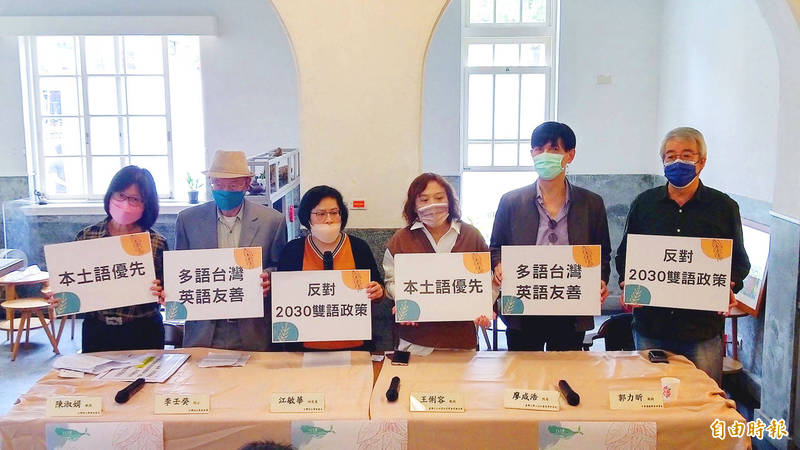《TAIPEI TIMES》 English plans ‘ignore’ linguistic diversity

Members of the Taiwan Languages and Literature Society and other civic groups hold placards against the government’s language policy at a news conference in Taipei yesterday. Photo: Rachel Lin, Taipei Times
ERODING IDENTITY: The English 2030 ‘bilingual’ policy shuns other languages spoken by indigenous communities and threatens Taiwan’s linguistic heritage, experts said
By Jason Pan / Staff reporter
Civic groups and academics yesterday requested that the government rethink its Bilingual 2030 concept and instead consider what they call multilingual, English-friendly Taiwan, prioritizing Taiwan’s native languages.
The government’s current push for Mandarin and English “bilingualism” ignores the other languages in Taiwan that make millions of Taiwanese already bilingual or multi-lingual, and overlooks Taiwan’s multiethnic population, Taiwan Languages and Literature Society director Chiang Min-hua (江敏華) said.
While the Bilingual 2030 plan would elevate English to one of Taiwan’s working languages, it could affect Taiwan’s rich language heritage and diminish Hoklo (commonly known as Taiwanese), Hakka, along with other indigenous mother tongues, as well as the Mindong dialect on Matsu Island, Chiang said at a news conference in Taipei.
The ministry’s push for English instruction in math, science, music and arts elevates English above languages native to Taiwan, she said.
“The 2030 bilingual plan pushes English into a top position among the many languages spoken and used by many segments of society. It would erode Taiwan’s identity as a sovereign state, and sever people’s homeland roots,” said Chiang, a linguistics research fellow at Academia Sinica.
“Taiwan is well known for the diverse mother tongues that its people have kept alive, and this is part of these groups’ cultural heritage,” said Paul Jen-kuei Li (李壬癸), an expert on Austronesian languages.
“Our society’s most distinctive cultural features are the diverse Austronesian languages, which are in danger of disappearing. Most younger generations from indigenous communities cannot speak their mother tongues,” he said, adding that preserving and reviving these languages should be a priority.
Chiang said that a signature drive that started on Feb. 21, International Mother Language Day, has garnered about 1,700 signatures for the cause, including the names of about 400 academics and linguistic researchers, and about 400 schoolteachers.
The groups asked for support from lawmakers to review the Bilingual 2030 policy and to not approve a bill to establish a Bilingual Nation Development Center.
新聞來源:TAIPEI TIMES










